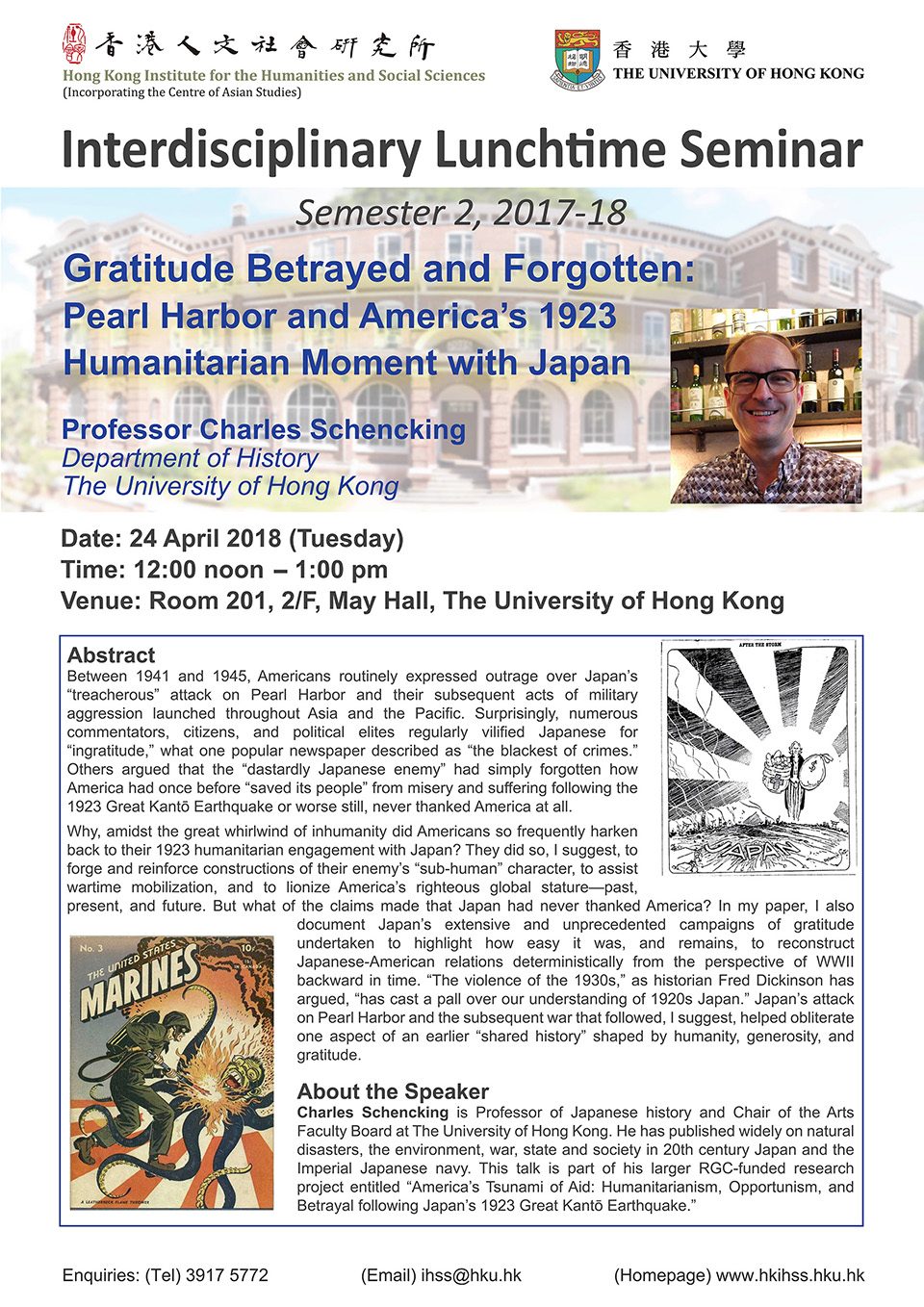- ABOUT IHSSABOUT IHSS
- PEOPLE
- NEWS & EVENTSNEWS & EVENTS
- RESEARCHRESEARCH
- FELLOWSHIPS & GRANTSFELLOWSHIPS & GRANTS
- TEACHING & LEARNINGTEACHING & LEARNING
- PUBLICATIONSPUBLICATIONS
Interdisciplinary Lunchtime Seminar
Gratitude Betrayed and Forgotten: Pearl Harbor and America’s Humanitarian Moment with Japan in 1923
Professor Charles Schencking
Department of History, The University of Hong Kong
Date: April 24, 2018 (Tuesday)
Time: 12:00 – 13:00
Venue: Room 201, 2/F, May Hall, The University of Hong Kong
Enquiry: (852) 3917-5772, ihss@hku.hk
Interdisciplinary Lunchtime Seminar
Gratitude Betrayed and Forgotten: Pearl Harbor and America’s Humanitarian Moment with Japan in 1923
Professor Charles Schencking
Department of History, The University of Hong Kong
Date: April 24, 2018 (Tuesday)
Time: 12:00 – 13:00
Venue: Room 201, 2/F, May Hall, The University of Hong Kong
Enquiry: (852) 3917-5772, ihss@hku.hk
Title:
Gratitude Betrayed and Forgotten: Pearl Harbor and America’s Humanitarian Moment with Japan in 1923
Speaker:
Date:
April 24, 2018
Time:
12:00 nn – 1:00 pm
Venue:
Room 201, 2/F, May Hall, The University of Hong Kong (Map)
Language:
English
Enquiry:
(Tel) (852) 3917-5772
(Email) ihss@hku.hk
Between 1941 and 1945, Americans routinely expressed outrage over Japan’s “treacherous” attack on Pearl Harbor and their subsequent acts of military aggression launched throughout Asia and the Pacific. Surprisingly, numerous commentators, citizens, and political elites regularly vilified Japanese for “ingratitude,” what one popular newspaper described as “the blackest of crimes.” Others argued that the “dastardly Japanese enemy” had simply forgotten how America had once before “saved its people” from misery and suffering following the 1923 Great Kantō Earthquake or worse still, never thanked America at all.
Why, amidst the great whirlwind of inhumanity did Americans so frequently harken back to their 1923 humanitarian engagement with Japan? They did so, I suggest, to forge and reinforce constructions of their enemy’s “sub-human” character, to assist wartime mobilization, and to lionize America’s righteous global stature — past, present, and future. But what of the claims made that Japan had never thanked America? In my paper, I also document Japan’s extensive and unprecedented campaigns of gratitude undertaken to highlight how easy it was, and remains, to reconstruct Japanese-American relations deterministically from the perspective of WWII backward in time. “The violence of the 1930s,” as historian Fred Dickinson has argued, “has cast a pall over our understanding of 1920s Japan.” Japan’s attack on Pearl Harbor and the subsequent war that followed, I suggest, helped obliterate one aspect of an earlier “shared history” shaped by humanity, generosity, and gratitude.
Charles Schencking is Professor of Japanese history and Chair of the Arts Faculty Board at The University of Hong Kong. He has published widely on natural disasters, the environment, war, state and society in 20th century Japan and the Imperial Japanese navy. This talk is part of his larger RGC-funded research project entitled “America’s Tsunami of Aid: Humanitarianism, Opportunism, and Betrayal following Japan’s 1923 Great Kantō Earthquake.”

Copyright © 2025 Hong Kong Institute for the Humanities and Social Sciences, The University of Hong Kong. All Rights Reserved.